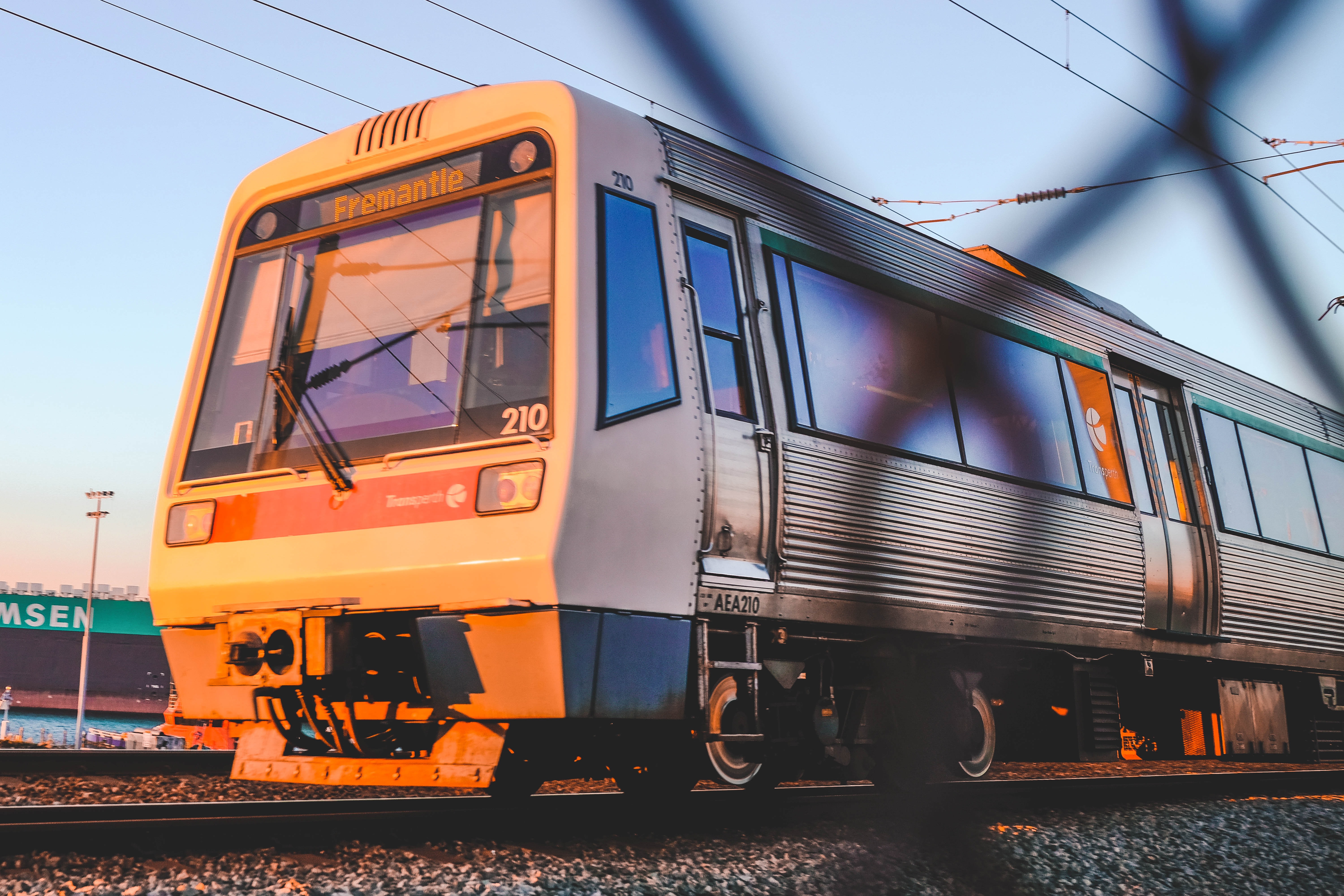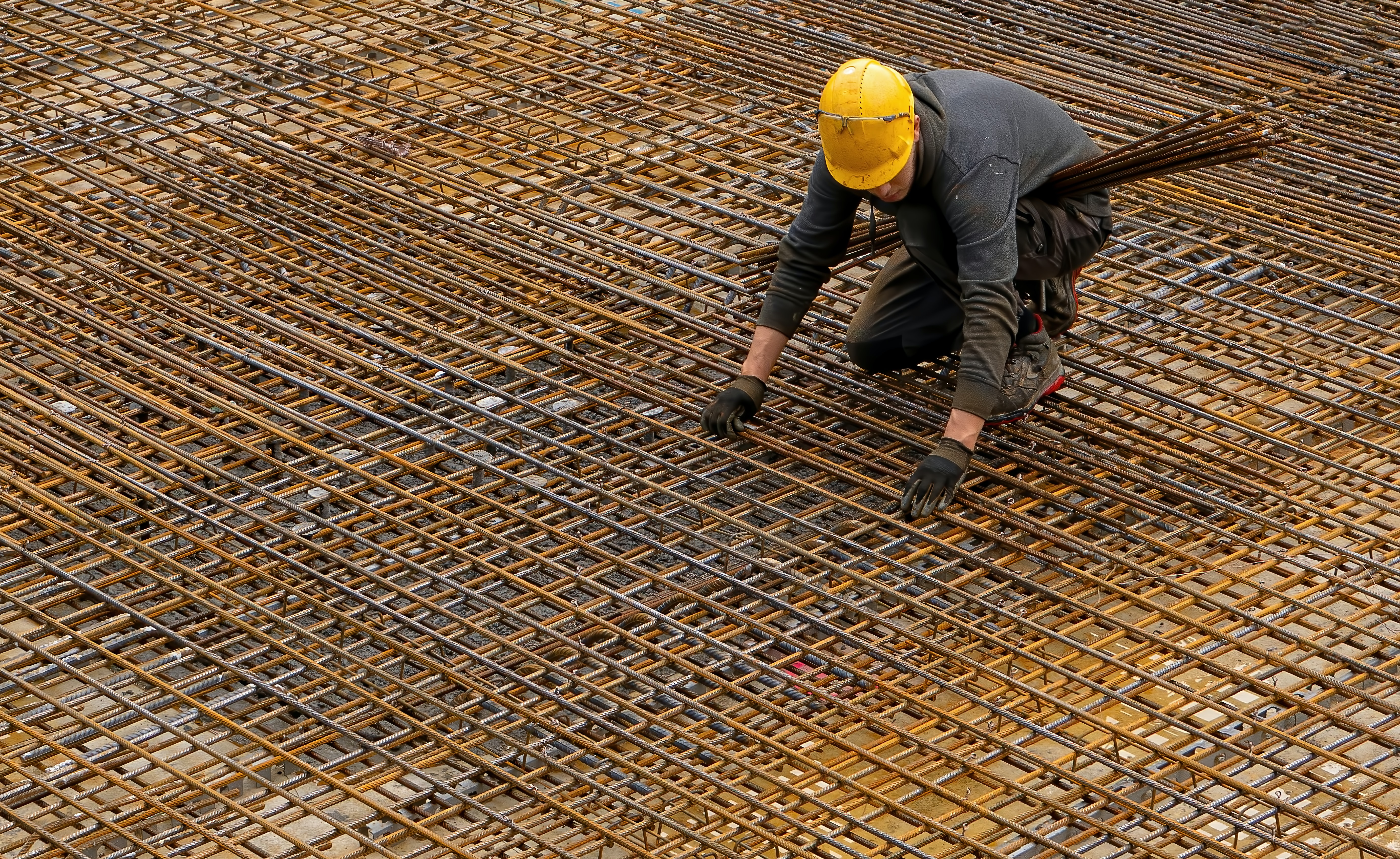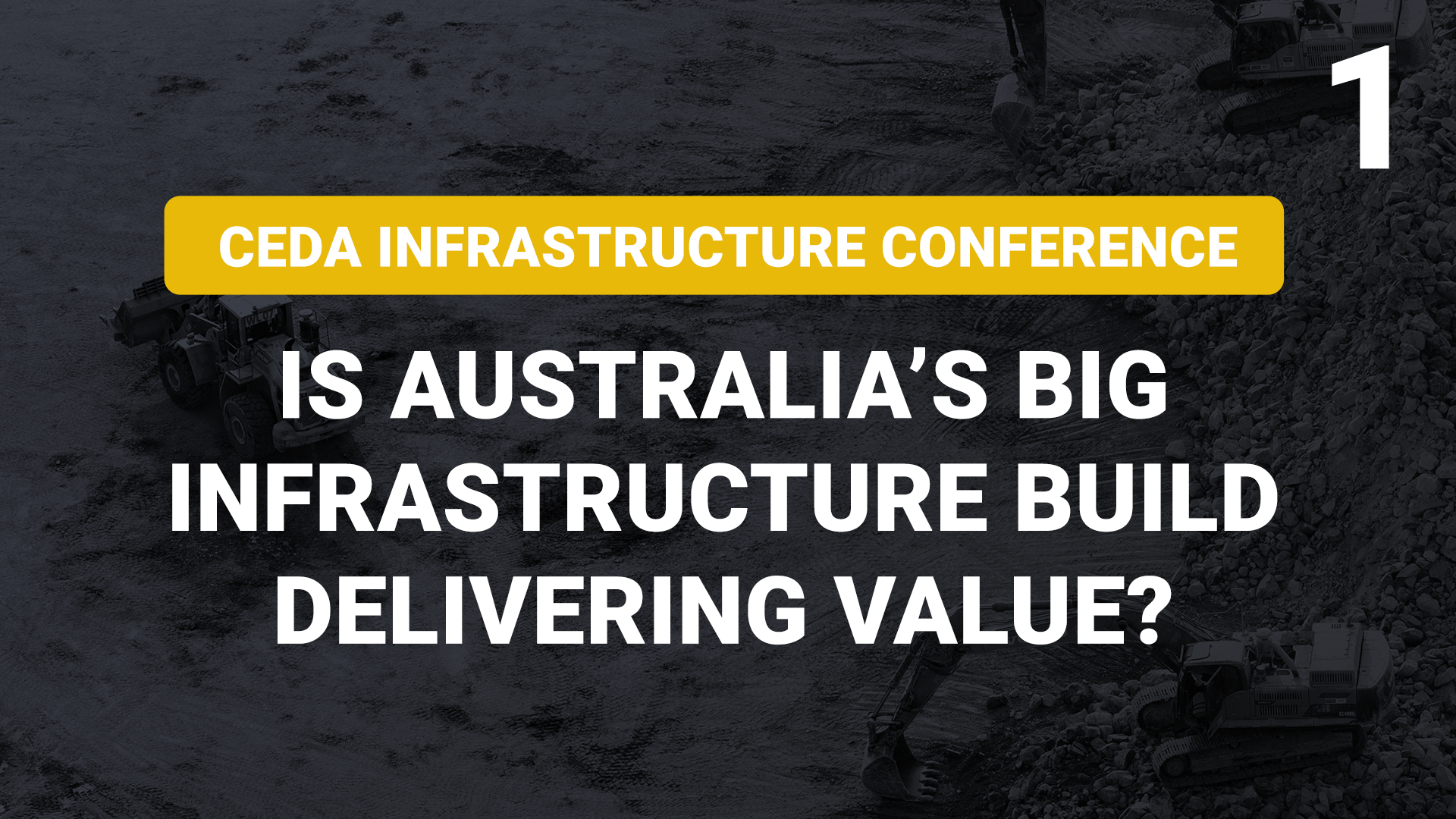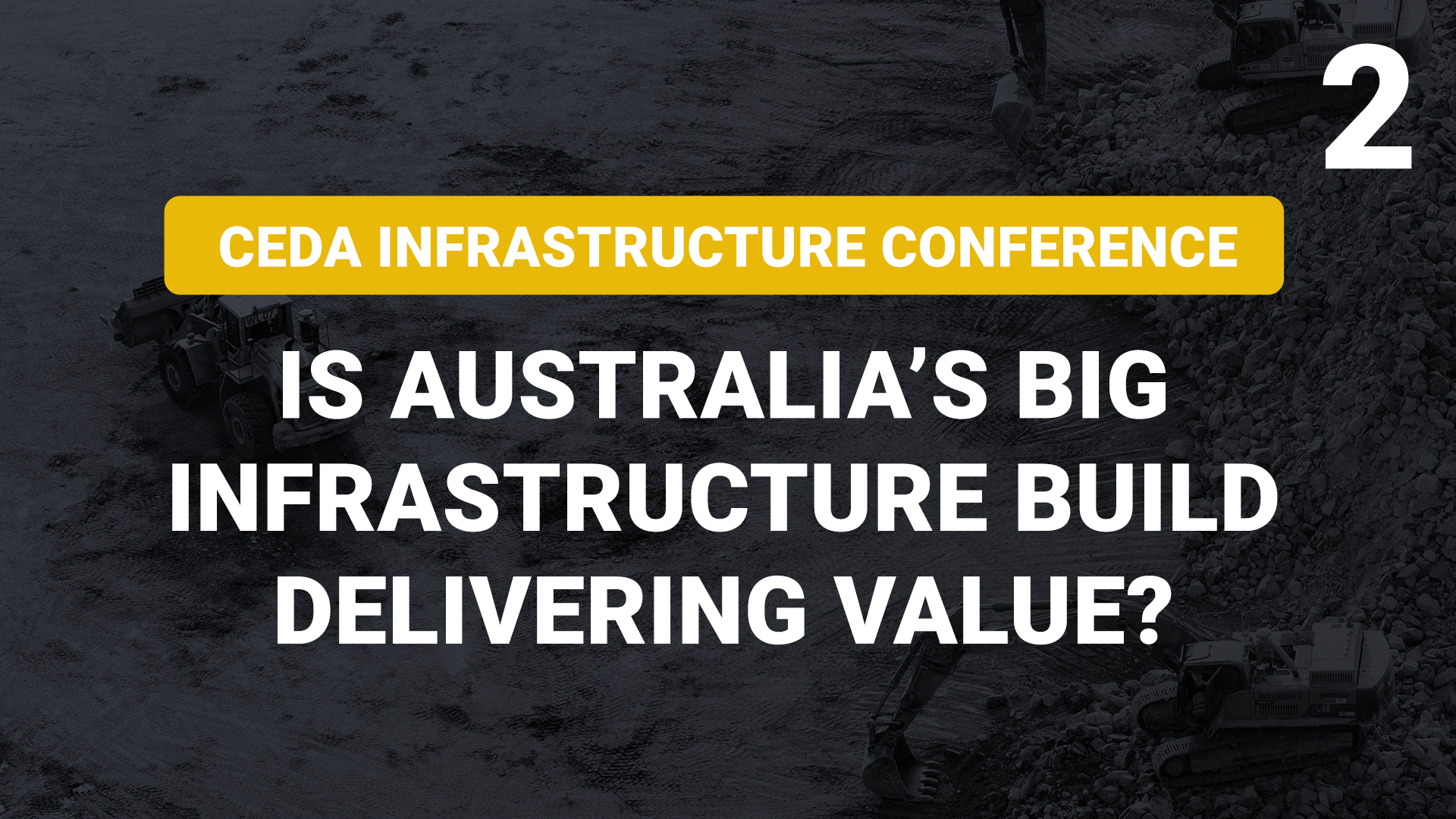
12/04/2024
-
A view from the opposition with Senator Bridget McKenzie | CEDA Infrastructure Conference 2024What are the federal opposition’s priorities on infrastructure? Hear from Senator the Hon. Bridget McKenzie.
-
Australia’s infrastructure outlook: pathways and strategy | CEDA Infrastructure Conference 2024"There is absolutely a requirement on government to take some bold decisions." This panel provided an industry outlook for the infrastructure sector in 2024, discussing topics including the role of government and key findings and recommendations of recent reviews. Hear from: - Annabel Crookes, Director, Legal, Risk & Delivery, Laing O'Rourke Australia and President, Australian Constructors Association - Clare Gardiner-Barnes, Panel Member, Infrastructure Investment Program Review - Said Hirsh, Head of Strategy, Planning and Innovation, Infrastructure NSW - Gabrielle Trainor AO, Chair, Infrastructure Australia
-
Brisbane 2032 Olympic and Paralympic Infrastructure Program | CEDA Infrastructure Conference 2024“Those investments at that time, absolutely have long-running benefits to the community...[the Brisbane Olympics] will build community assets in time for the games but not necessarily just for the games.”
Executive Director of the Olympic and Paralympic Infrastructure Office, Damon Hall, gave an update on the independent sport venue review and long-term benefits that the Brisbane 2032 Olympic Games infrastructure will provide. -
Collaboration for better outcomes | CEDA Infrastructure Conference 2024Get a summary of key takeaways from the conference on how industry and government can work together to achieve better outcomes.
Hear from: - Clare Gardiner-Barnes, Panel Member, Infrastructure Investment Program Review, CGB Consulting Pty Ltd - Malcolm Smith, Cities – Australasia Leader, Arup - Melinda Cilento, Chief Executive, CEDA -
Federal government priorities with the Hon. Catherine King | CEDA Infrastructure Conference 2024“How are we actually ensuring that we are investing in productivity-building infrastructure? How are we making sure that our infrastructure investment actually also meets our needs in relation to decarbonisation?”
Federal Minister for Infrastructure, Transport, Regional Development and Local Government, the Hon. Catherine King, addressing her priorities and opportunities for infrastructure in 2024. -
Infrastructure in regional and remote areas | CEDA Infrastructure Conference 2024With infrastructure projects crucial in fostering community engagement and future proofing regional areas, hear what this panel of experts shared at our Infrastructure Conference on this topic.
Hear from: - Erin Coldham, Chief Development Officer, Star of the South - Paul Dobing, Chief Executive Officer, Developing East Arnhem Limited - Steven Harding, B.Eng (Civil & Computing), MBA, Adv Grad Dip Legal Studies, GAICD, Chief Executive Officer, Shire of East Pilbara - Liz Ritchie, Chief Executive Officer, Regional Australia Institute - Melinda Cilento, Chief Executive, CEDA -
NSW infrastructure outlook with the Hon. Jenny Aitchison | CEDA Infrastructure Conference 2024Hear about the NSW government’s infrastructure agenda after NSW Minister for Regional Transport and Roads, the Hon. Jenny Aitchison's first year in office.
-
Transforming our cities | CEDA Infrastructure Conference 2024Discussing Australia's unique opportunity to leverage the lessons of the pandemic and build resilient, inclusive and sustainable cities for the future.
Hear from: - Monica Barone, Chief Executive Officer, City of Sydney - Adrian Collette AM, Chief Executive Officer, Creative Australia - Eliza Owen, Head of Research, CoreLogic - Malcolm Smith, Cities – Australasia Leader, Arup -
CEDA CEO, Melinda Cilento and NSW Minister for Regional Transport and Roads, the Hon. Jenny Aitchison.
-
Federal Minister for Infrastructure, Transport, Regional Development and Local Government, the Hon. Catherine King.
-
Systra ANZ, Executive General Manager, Transport Consulting, Caroline McGeechen; Melbourne Airport, Executive General Manager of Strategy, Planning and Community, Justin Portelli and IFM Investors, Executive Director, Aleatica, Aaron McGovern.
-
Federal Minister for Infrastructure, Transport, Regional Development and Local Government, the Hon. Catherine King.
-
Shadow Minister for Infrastructure, Transport and Regional Development, senator the Hon. Bridget McKenzie.
-
CGB Consulting Pty Ltd Panel Member, Infrastructure Investment Program Review, Clare Gardiner-Barnes.
-
Australian Constructors Association President and Laing ORourke Australia Director, Annabel Crookes.
-
CEDA CEO, Melinda Cilento and NSW Minister for Regional Transport and Roads, the Hon. Jenny Aitchison.
-
CEDA Associate Director Content Programming, Joanne O'Callaghan and NSW Minister for Regional Transport and Roads, the Hon. Jenny Aitchison.

EXPLORE OPINION ARTICLES
Skills shortage threatens Australia’s future prosperity
Australia has ambitious plans for the future of public and private infrastructure, yet we do not have the people and skills to turn that vision into a reality, writes David Simpson, Chief Executive Transport, The APP Group. READ MORE.
Olympics 2032: Can Brisbane come out a winner?
Despite optimistic estimates before the event, few host cities have experienced a sustained increase in tourism after holding the Games. This is, however, a point on which the Brisbane games may differ, writes Professor John Quiggin. READ MORE.
The state of mental health in the construction industry
Long work hours, high-pressure project targets and fixed-time contracts contribute to the infrastructure industry being deemed at high-risk for mental ill-health. Supporting mental wellbeing is vital to the industry's continued success, writes Grant Fuller and Professor Luke Downey. READ MORE.
Women in rail: breaking occupational segregation in the rail industry
Making the rail sector more appealing and inclusive for women and other candidates from diverse backgrounds is crucial to delivering the projected $155 billion in rail infrastructure investment across Australia over the next 15 years, writes National Rail Leader at GHD John Cranley. READ MORE.
Why we need investment in social infrastructure
Robust social infrastructure is essential for the good of our society and the growth of our economy, yet without adequate investment, rising demand from our ageing and growing population will not only cause drastic social and health problems but impact our future prosperity as well, writes Executive General Manager of Social Infrastructure at Australian Unity Ryan Banting. READ MORE.
Keynote address: Federal Minister for Infrastructure, the Hon. Catherine King
At the 2024 Infrastructure Conference, the Hon. Catherine King joined CEDA to discuss the Federal Government's infrastructure reform agenda.
"Today, the Commonwealth is investing more money in infrastructure across Australia than at any point in our history – with the 10-year pipeline now sitting at a bit over $120 billion.
We are jointly funding more than 440 major projects across the nation, including 99 here in NSW.
With that investment, we are delivering nation shaping projects which support a range of economic and social objectives, including regional connectivity, liveability and safety – including our current commitment to major projects across this state like the $10.4 billion Sydney Metro to Western Sydney Airport and the $2.1 billion M1 Pacific Motorway Extension to Raymond Terrace."

EXPLORE OPINION ARTICLES
The Economic, Social and Environmental benefits of building up rather than out
Over the past few years, we’ve become all too aware that we don’t have enough homes in New South Wales. The ABS reports that residential rents in Sydney – the best barometer of housing affordability – rose 8.6 per cent over the 12 months to September 2023. For those struggling with the cost of keeping a roof over their heads, there seems to be little relief in sight. Earlier this month, the NSW Productivity Commission published the latest report in our housing series, What we gain by building more homes in the right places. We show that ‘building up’ rather than ‘out’ also has economic, social and environmental benefits, writes Peter Achterstraat AM, NSW Productivity Commissioner.READ MORE.
Invest in the invisible: connected freight to improve productivity and sustainability
There is a big task ahead to futureproof the freight system for a more productive, resilient and sustainable Australia. There needs to be a long-term, cohesive effort by governments and industry to get this right. Government’s role is to make targeted infrastructure investments and to create the right policy settings, so that industry has the confidence to invest in the right operations, writes WSP's Sam Potts and Jim Hirst. READ MORE.
Cities are Australia's superpower
How do we make our cities more productive? The economies of our cities have transformed markedly over the past 20 years and are increasingly dominated by ‘knowledge’ industries. To improve productivity in our knowledge industries, the core challenge is to ensure we fill our cities with talented people and that we create the conditions that enable them to be at their best, writes City Economist at the City of Melbourne Andrew Wear. READ MORE.
Tackling productivity challenges in Australia's infrastructure industry
To overcome stagnant productivity in the infrastructure industry, a comprehensive, multifaceted approach is required. This approach should encompass the development and retention of a skilled and diverse workforce, the adoption of digital technologies, the implementation of best governance practices, the reform of procurement processes, a rethink on our educational offerings and the prioritisation of mental health and continuous learning, writes Engineers Australia CEO Romilly Madew. READ MORE.
EV charging infrastructure key to affordable and just transition
Government and industry need a flexible approach to electric vehicle (EV) infrastructure to ensure EV adoption does not increase costs unnecessarily. Corporations and governments have a responsibility to get the balance right to ensure EV adoption is a part of a just transition, considering access and affordability, writes Roger Walker. READ MORE.
-
Federal Priorities and Challenges with the Hon. Catherine King | Infrastructure Conference CEDA 2023
-
Dr Kerry Schott AO, Non Executive Director, Melinda Cilento, Chief Executive, CEDA, Seved Robin, Chief Executive Officer, Bouygues Construction and Annabel Crookes, Director, Legal, Laing O'Rourke Australia & President, Australian Constructors Association
-
An Nguyen, Executive Director – Infrastructure Delivery, Victorian Department of Treasury and Finance, Peter Hannam, Director – Asset Management, IFM Investors, Esther Kerr-Smith, Chief Executive Officer Wealth and Capital Markets, Australian Unity and Paul Kenny, Consultant, Allens
-
The Hon Catherine King MP, Minister for Infrastructure, Transport, Regional Development and Local Government, Parliament of Australia
-
Don Johnson, Chief Operating Officer, CPB Contractors, Gabrielle Trainor AO, Interim Chair, Infrastructure Australia, Professor Jennifer Whyte, Director, John Grill Institute for Project Leadership, Head of School, Project Management, The University of Sydney and Andrew Barker Senior Economist, CEDA
-
Ryan Banting, Executive General Manager, Social Infrastructure, Australian Unity, Dr Jonathan Spear, Chief Executive Officer, Infrastructure Victoria and Kate O'Sullivan, Executive Director, Infrastructure Policy and Assurance, Victorian Department of Treasury and Finance
-
The Hon Catherine King MP, Minister for Infrastructure, Transport, Regional Development and Local Government, Parliament of Australia and Diane Smith-Gander AO, National Chair, CEDA
-
The Hon. Jacinta Allan MP, Deputy Premier of Victoria and Minister for Transport, Infrastructure and the Suburban Rail Loop, Parliament of Victoria
-
Fleur Laurence, Partner, Integrated Infrastructure, Stakeholder and Community Engagement, PwC Australia
-
Senator Bridget McKenzie, Shadow Minister for Infrastructure, Transport and Regional Development, Parliament of Australia
-
Is Australia's big infrastructure build delivering value? | Part 1Join us for this inaugural full-day event featuring; Federal Minister for Communications, Urban Infrastructure, Cities, and the Arts the Hon. Paul Fletcher and the Shadow Minister for Infrastructure, Transport, and Regional Development the Hon. Catherine King, as well as a wide range of leaders from industry and government, on how we can seek to maximise the value of our infrastructure for future generations.
-
Is Australia's big infrastructure build delivering value? | Part 2Join us for this inaugural full-day event featuring; Federal Minister for Communications, Urban Infrastructure, Cities, and the Arts the Hon. Paul Fletcher and the Shadow Minister for Infrastructure, Transport, and Regional Development the Hon. Catherine King, as well as a wide range of leaders from industry and government, on how we can seek to maximise the value of our infrastructure for future generations.


.png?lang=en-US&ext=.png)
.png?lang=en-US&ext=.png)
.png?lang=en-US&ext=.png)
.png?lang=en-US&ext=.png)

.png?lang=en-US&ext=.png)
.png?lang=en-US&ext=.png)
.png?lang=en-US&ext=.png)
.png?ext=.png)
.png?ext=.png)
.png?ext=.png)
.png?ext=.png)
.png?ext=.png)
.png?ext=.png)
.png?ext=.png)
.png?ext=.png)

